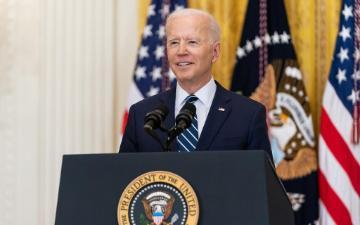
President Joe Biden smiles during his first official press conference Thursday, March 25, 2021, in the East Room of the White House. Photo by: Adam Schultz/Official White House Photo/Flikr.
Ann Skeet (@leaderethics) is the senior director of leadership ethics with the Markkula Center for Applied Ethics at Santa Clara University. Views are her own.
President Biden’s performance in the first presidential debate has opened a national discussion about his fitness to serve in office. Whether President Biden chooses to leave the presidential race is a matter of political strategy but also of ethics. Is it ethical for him to stay in the race, given the concerns his performance sparked? In this case, matters of ethics and strategy are intertwined.
President Biden has repeatedly made the point that former President Donald Trump puts his own interests above those of the American people. Biden has faulted Trump for caring more about his own power than the impact of his actions on his constituents. Others are now claiming that President Biden, and his supporters, are putting their political interests above the interests of the country.
In reality, President Biden is putting his own interests ahead of the American people and ahead of the political interests of his supporters. Following his interview with ABC’s George Stephanopoulos, it is now clear that Biden is most interested in proving that people are, once again, wrong about his prospects, and that, like the other times he has been discounted, he will rally and prove his doubters wrong. He reiterated that he would not leave the race unless “the Lord Almighty” asked him to.
Unfortunately, the assessment on how well he is serving the American people does not rest on whether he wins the election in November—that is a matter of whether he serves political interests and we will get to that in a moment. Rather the question rests on his ability to do his job now, which is clearly in question following the debate and the interview. In the interview, he could not recall if he had even watched the debate and resisted suggestions that he undergo medical assessments of his current neurological condition. A president concerned with serving the American people would want to know he was fit to do so.
We have other less dramatic examples of presidents acknowledging that their health could alter their ability to perform their duties. President George W. Bush transferred his power of presidential duties to his vice-president during each of two colonoscopies he had while in office, invoking Amendment 25, Section 3, of the Constitution. As I have written before, by using this amendment, he put the interests of the American people first insuring there was a clear line of decision-making authority and steady presence in the office at all times. Bush followed a precedent set by President Ronald Reagan, who invoked the section while he underwent colon cancer surgery in 1985.
I have also written about how helpful the Constitution’s preamble can be in deciding what constitutes an ethical decision for someone who has taken an oath to uphold it. Culling a set of questions from the preamble, an officeholder facing an ethical dilemma can ask themselves, “What are the options now that offer justice, insure domestic tranquility and keep the peace, provide for a common defense, promote the general welfare, and secure the blessings of liberty?” A chief executive officer facing the effects of ill health is hard pressed to fulfill some of these obligations. The only reasonable way for President Biden to settle the question of his health and current capacity is to undergo the neurological testing suggested in the ABC interview and by others. It is also a compassionate way to manage a situation so many people face, one where they are not able to objectively assess their own limitations.
And, there is evidence that people close to the president are seeking compassionate solutions to the quandary Biden’s debate performance has presented. Many are speaking about the gratitude they feel for a lifetime of service. Political allies are glad he was able to beat President Trump in the last election. But these are no guarantees that he can do so again and this brings us to how a candidate should serve the interests of their party.
When asked how he would feel if he lost the election in November by Stephanopoulos, President Biden said, “I’ll feel, as long as I gave it my all, and I did as good a job as I know I can do, that’s what this is about.” Unfortunately, it isn’t what it is about. For the Democratic Party, it’s about putting up the candidate that has the best odds against former President Trump and by any measure right now—polls, approval ratings, donor support, public statements from Democratic officeholders—President Biden’s candidacy does not represent the best odds. Here, political strategy and ethics meet, as President Biden appears to no longer be meeting the interests of the Democratic Party either.
We have seen other elected officials step down at moments when they feel they can no longer serve their party’s interests or their official duties. Sometimes the ethical thing to do is also the politically expedient thing to do. Even when it doesn’t work out that neatly, the basic question remains the same: is the officeholder placing the interests of those they serve ahead of their own? Without a neurological test, or a choice to step down, we can no longer be sure President Biden is doing so.